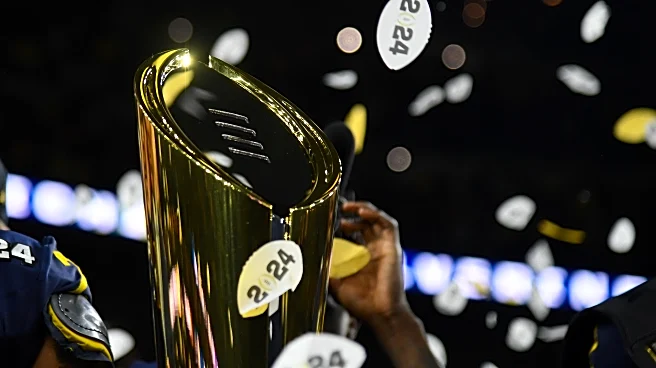The initial batch of College Football Playoff rankings were released on Tuesday night, and the Michigan Wolverines checked in at No. 21.
After a night to reflect on where things stand with Michigan and some
of the other teams heading into the final few games of the regular season, I came to a potentially unpopular conclusion — the Wolverines absolutely should have canceled their series with Texas and Oklahoma, and they should cancel the future home-and-home with Notre Dame.
Had Michigan chosen to cancel those games, it very likely would have had a much easier “cupcake” opponent in Week 2 this season instead of the 24-13 loss to the Sooners it suffered. The Wolverines would be 8-1 overall and very likely in the CFP as things stand today.
Of course, the only ranking that matters is the ranking after The Game against Ohio State. However, even if Michigan were to lose that game in the world where Warde Manuel axed the Oklahoma series, Michigan would be 10-2 and still have a good shot at making the CFP. Back to reality — the Wolverines have to win out, including beating the No. 1 Buckeyes, to even have a decent chance at making it in.
An extra win goes a really long way as it pertains to making the CFP, and teams like Michigan with an early-season loss on its resume are being punished. At least, that’s what CFP Chair Mack Rhoades made it sound like when asked if the committee takes a team’s non-conference schedule into account for their ranking:
If that’s how the committee is going to evaluate teams moving forward, why even play good teams in the non-conference? Why should the Wolverines have Texas and OU on the schedule the next two years, and Notre Dame in the early 2030s, when they could play Akron instead and have that game count just the same? Why risk having a loss on your resume when you could have Bowling Green come to the Big House and better set yourself up for a run in the CFP?
Curt Cignetti and the Indiana Hoosiers are a prime example why playing a weak non-conference schedule is the way to go. Their non-conference slate this season featured Old Dominion, Kennesaw State and Indiana State — they won those games by a combined score of 156-23. They weren’t tested, but they came out unscathed and set themselves up for the Big Ten season — that’s all that matters now to the CFP Committee.
The Hoosier’s non-conference schedule next season? North Texas, Howard and Western Kentucky. In 2027, they will face Old Dominion, Kennesaw State and UMass. And in 2028, it’s Austin Peay, Eastern Michigan and Miami (Ohio). You have to go all the way to 2030 before Indiana takes on a legitimate opponent (Notre Dame).
Some people may scoff at Indiana’s non-conference schedule, but in order to have the best odds at making the CFP — which is all fans and donors care about these days, any non-CFP bowl game won’t cut it anymore when there are millions of dollars tied to a lot of these players — this is the model to take moving forward.
Now, am I in favor of all of this? Despite everything I just wrote, the answer is no. I think all Power 4 teams should have to play another Power 4 opponent in the non-conference portion of the schedule every season. To make things fair for every team, and to give the fans some fantastic matchups early in the season, this would be the best course of action.
College football was once built on heavyweight non-conference games that helped defined a team’s entire season before conference play even began — Michigan vs. Notre Dame was an early-season staple for decades and was one of the games I used to look forward to every year, and I would love nothing more than for that rivalry game to happen yearly. But if the CFP Committee doesn’t care who you play, it’s clear that surviving your schedule matters more than the strength of your schedule.
Until/unless there is a rule change where every Power 4 team is required to play another Power 4 team every season, the Wolverines (and all other teams with CFP aspirations) should immediately stop scheduling big time non-conference matchups in order to maximize their playoff chances in the future.










